|
 Secure Site
Secure Site
|
 |
Archive for the 'Now & Zen Alarm Clocks' Category
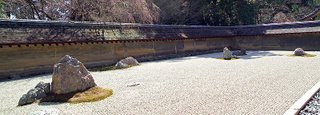 Stone garden in the karesansui style at Ryōan-ji. Karesansui Gardens or “dry landscape” gardens were influenced mainly by Zen Buddhism and can be found at Zen temples of meditation.
In Japanese culture, garden-making is a high art, intimately related to the linked arts of calligraphy and ink painting.
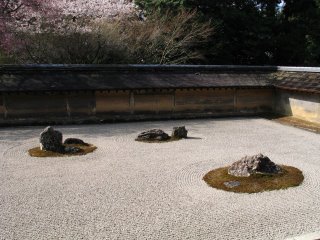 Ryōan-ji Unlike other traditional gardens, there is no water present in Karesansui gardens. However, there is raked gravel or sand that simulates the feeling of water.
The rocks/gravel used are chosen for their artistic shapes, and mosses as well as small shrubs are used to further garnish the Karesansui style (Japanese Lifestyle).
All in all, the rocks and moss are used to represent ponds, islands, boats, seas, rivers, and mountains in an abstract way. Ryoan-ji, temple in Kyoto, has a garden famous for representing this style. Daisen-in, created in 1513, is also particularly renowned.
adapted from wikipedia.org
 Zen Clocks by Now & Zen, Boulder, CO Now & Zen
1638 Pearl Street
Boulder, CO 80302
(800) 779-6383
Posted in Chime Alarm Clocks, mindfulness practice, Natural Awakening, Now & Zen Alarm Clocks, Zen Clocks and Dream Recall, Zen Timers
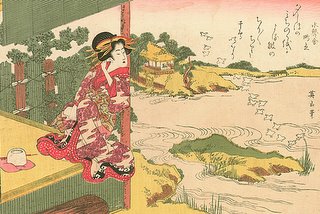 zen garden from tea house, Eizan (1787-1867), Noda River Ukiyo-e Often thought of as tranquil sanctuaries that allow individuals to escape from the stresses of daily life, Japanese gardens are designed for a variety of purposes. Some gardens invite quiet contemplation, but may have also been intended for recreation, the display of rare plant specimens, or the exhibition of unusual rocks.
adapted from wikipedia.org
 Bamboo Alarm Clocks & Meditation Timers Now & Zen
1638 Pearl Street
Boulder, CO 80302
Posted in Chime Alarm Clocks, Japanese Inspired Zen Clocks, Now & Zen Alarm Clocks, Progressive Awakening, Zen Clocks and Dream Recall, Zen Timers
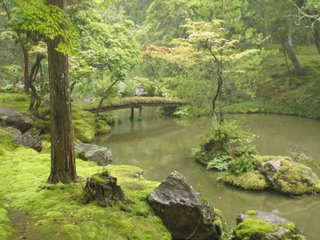 The famous moss garden of Saihō-ji. Saihō-ji is a Rinzai Zen Buddhist temple located in Matsuo, Nishikyō Ward, Kyoto, Japan. The temple, which is famed for its moss garden, is commonly referred to as “Koke-dera”, meaning “moss temple”, and is also known as “Kōinzan Saihō-ji”.
The famous moss garden of Saihō-ji is situated in the eastern temple grounds. Located in a grove, the garden is arranged as a circular promenade centered around Golden Pond. The pond is shaped like the Chinese character for “heart” or “mind” and contains three small islands: Asahi Island, Yūhi Island, and Kiri Island. The area around the pond is said to be covered with more than 120 varieties of moss, believed to have started growing after the flooding of the temple grounds in the Edo Period (1603 to 1868).
 Bamboo Zen Chime Clocks & Timers adapted from wikipedia.org
Now & Zen
1638 Pearl Street
Boulder, CO 80302
Posted in Bamboo Chime Clocks, Chime Alarm Clocks, Japanese Inspired Zen Clocks, Meditation Timers, Meditation Tools, Now & Zen Alarm Clocks, Progressive Awakening, Yoga Timer, Yoga Timers by Now & Zen
 Arizona The act of being mindful is simply a way of maintaining a higher level of awareness in daily life action and thoughts. One of our favorite ways to practice being mindful is to hike.
Hiking is an outdoor activity which consists of walking in natural environments, often on hiking trails.
Hiking is one of the fundamental outdoor activities on which many others are based. Many beautiful places can only be reached overland by hiking, and enthusiasts regard hiking as the best way to see nature. Hiking over long distances or over difficult terrain requires both the physical ability to do the hike and the knowledge of the route and its pitfalls.
adapted from wikipedia.org
 Bamboo Zen Clock
Now & Zen
1638 Pearl Street
Boulder, CO 80302
(800) 779-6383
Posted in Japanese Inspired Zen Clocks, Meditation Timers, Meditation Tools, Now & Zen Alarm Clocks, Zen Timers
 Brigitte Mars, author, herbalist, and amazing raw food chef from Boulder, CO Peter’s Fairy Godmother, Brigitte Mars (an herbalist, famous author, and raw food chef from Boulder, CO) just gave him the Yoga Garden Game for his birthday! Our whole family loves to play this game at home and when we travel. We use our Zen Timer/Alarm Clock to practice holding each pose for 5 seconds.
Here are Peter’s favorite yoga Poses:
- Frog Pose
- Snake Pose
- Tree Pose
- Cat Pose
- Cow Pose
- Butterfly Pose
- Downward Facing Dog Pose
- Bridge Pose
- Bamboo Pose
 Yoga with kids in nature
 - Bamboo chime clock and yoga timer
Children love to move their bodies! Yoga improves their ability to concentrate and focus. Yoga helps children to be calm too!
Posted in Chime Alarm Clocks, Now & Zen Alarm Clocks, Yoga Timer, Yoga Timers by Now & Zen, Zen Timers
 Why We Sleep Why We Sleep?
Sleep may really be–A series of repeated cycles of pruning and strengthening of neural connections that enables you to learn new tricks without forgetting old ones. Of course, none of that explains why you have to be unconscious for all the pruning and strengthening to occur. Maybe it’s just easier to be asleep than awake while the work is going on. “When you fall asleep, it’s like you’re leaving your house and the workmen come in to renovate,” suggests Terry Sejnowski, a computational neurobiologist at the Salk Institute in La Jolla, Calif. “You don’t want to live in the house while the construction’s going on because it’s a mess.”
It all sounds plausible enough, but that doesn’t mean everyone is convinced. “It may not sound exciting, but I think sleep is essentially for rest,” says Robert Vertes, a neuroscientist at Florida Atlantic University in Boca Raton. Vertes thinks most sleep scientists are overinterpreting their data because they find it so hard to believe that our brains just need to shut down for eight hours or so every night. As for what’s being done during that time, the short answer, he says, is “We don’t know.”
Perhaps the brain just needs to restore itself. “We’ve all had the experience of going to bed with a problem, getting a good night’s sleep and waking up in the morning, and there’s a solution,” says Dr. Gregory Belenky, who recently retired as head of sleep research at the Walter Reed Army Institute of Research in Silver Spring, Md., and is now at Washington State University at Spokane. But instead of thinking that extra information processing is going on during sleep, he says it makes as much sense to suggest that depleted circuits are just being rejuvenated.
The brain, like the rest of the body, runs on glucose, Belenky explains. Using computerized scanners that provide images in real time, he and his colleagues have shown that the brain’s ability to use glucose drops off dramatically after being awake 24 hours, indicating a decrease in brain activity–despite the fact that there’s still plenty of glucose available. The biggest drops occur in exactly those areas of the cortex that anticipate and integrate emotion and reason. After 24 hours, however, the drop-off stabilizes. “But performance doesn’t level off,” Belenky notes. “It continues to tank.” Why? No one knows.
In addition to refueling the brain, sleep seems to detoxify it. Animals with a high metabolic rate, like field mice and bats, use a lot of calories and generate a lot of destructive molecules called free radicals. “The brain is particularly susceptible to this because neurons, by and large, don’t regenerate,” says Jerome Siegel, a neuroscientist at UCLA and the Veterans Affairs Medical Center in Los Angeles. Maybe sleep provides necessary downtime so that the brain can deal with all those free radicals.
One of the ultimate Zen like experiences is waking-up from a great slumber refreshed and energized. Your mind and body are harmoniously one, both alert and focused. Having a refreshed mind and body are two keys to a natural and Zen lifestyle. Waking up in the morning should not be a loud and abrupt awakening, but rather it should be a peaceful positive experience. The right natural alarm clock can transition your deep and tranquil sleep into a serene start to consciousness. Imagine a long-resonating Tibetan bell-like chime waking you up to a beautiful morning experience.
The right alarm clock can be the most beneficial investment for you. With our Now & Zen natural alarm clock you are awakened more gradually and thus more naturally. Now & Zen is focused on creating a naturalistic lifestyle, and our clocks are an example of our philosophy.
adapted from Time.com by Christine Gorman
 Gradual Chime Clocks for a Progressive Awakening Now & Zen – The Gradual Chime Alarm Clock Store
1638 Pearl Street
Boulder, CO 80302
(800) 779-6383
Posted in Bamboo Chime Clocks, Now & Zen Alarm Clocks, sleep, Sleep Habits
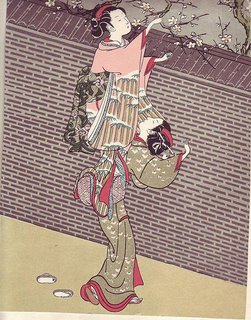 Utamaro Ukiyo-e, Two Ladies With Flowers The “Floating World” described the urban lifestyle, especially the pleasure-seeking aspects, of the Edo-period Japan (1600 –1867).
The term is also an ironic allusion to the homophone (the same as another word but differs in meaning) “Sorrowful World”, the earthly plane of death and rebirth from which Buddhists sought release.
The contemporary novelist Asai Ryoi, in his Ukiyo monogatari (“Tales of the Floating World”, c. 1661), provides some insight into the concept of the floating world:
… Living only for the moment, turning our full attention to the pleasures of the moon, the snow, the cherry blossoms and the maple leaves; singing songs, drinking wine, diverting ourselves in just floating, floating; … refusing to be disheartened, like a gourd floating along with the river current: this is what we call the floating world…
Ukiyo floating world adapted from wikipedia.org
One of the ultimate Zen like experiences is waking-up from a great slumber refreshed and energized. Your mind and body are harmoniously one, both alert and focused. Having a refreshed mind and body are two keys to a natural and Zen lifestyle. Waking up in the morning should not be a loud and abrupt awakening, but rather it should be a peaceful positive experience. The right natural alarm clock can transition your deep and tranquil sleep into a serene start to consciousness. Imagine a long-resonating Tibetan bell-like chime waking you up to a beautiful morning experience.
The right alarm clock can be the most beneficial investment for you. With our Now & Zen natural alarm clock you are awakened more gradually and thus more naturally. Now & Zen is focused on creating a naturalistic lifestyle, and our clocks are an example of our philosophy.
 Meditation Clock Timer- Zen Alarm Clock, Ukiyo-e Hokusai Wave Dial Face Now & Zen – The Zen Alarm Clock Store
1638 Pearl St.
Boulder, CO 80302
(800) 779-6383
Posted in Beauty, Cherry Blossoms, Chime Alarm Clocks, Hokusai Wave, Japanese Inspired Zen Clocks, Meditation Timers, Meditation Tools, Now & Zen Alarm Clocks, Progressive Awakening, Zen Timers
 koi fishes in the pond Koi or more specifically nishikigoi, (literally “brocaded carp”), are ornamental domesticated varieties of the common carp (Cyprinus carpio) that are kept for decorative purposes in outdoor ponds and water gardens. They are also called Japanese carp.
adapted from wikipedia.org
One of the ultimate Zen like experiences is waking-up from a great slumber refreshed and energized. Your mind and body are harmoniously one, both alert and focused. Having a refreshed mind and body are two keys to a natural and Zen lifestyle. Waking up in the morning should not be a loud and abrupt awakening, but rather it should be a peaceful positive experience. The right natural alarm clock can transition your deep and tranquil sleep into a serene start to consciousness. Imagine a long-resonating Tibetan bell-like chime waking you up to a beautiful morning experience.
The right alarm clock can be the most beneficial investment for you. With our Now & Zen natural alarm clock you are awakened more gradually and thus more naturally. Now & Zen is focused on creating a naturalistic lifestyle, and our clocks are an example of our philosophy.
 mindful of the koi
Now & Zen – The Zen Alarm Clock Store
1638 Pearl Street
Boulder, CO 80302
(800) 779-6383
Posted in Chime Alarm Clocks, Now & Zen Alarm Clocks, Progressive Awakening, Zen Timers
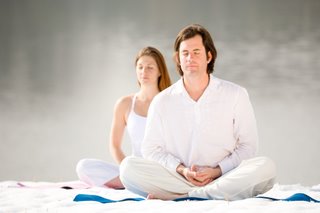 How to feel more compassionate Maitryadisu balani
The cultivation of friendliness creates inner strength. (Yoga Sutra III.24)
We typically think of our emotional range as something that is fixed and unchanging—a reflection of the personality we’re born with. But research is revealing the possibility that we may be able to cultivate and increase our ability to feel the emotional state of compassion. Researchers have found that feeling connected to others is as learnable as any other skill. “We are trying to provide evidence that meditation can cultivate compassion, and that you can see the change in both the person’s behavior and the function of the brain,” Lutz says.
So what does compassion look like in the brain? To find out, Lutz and his colleagues compared two groups of -meditators—one group whose members were experienced in compassion meditation, and the other a group whose members were not—and gave them the same instructions: to generate a state of love and compassion by thinking about someone they care about, extend those feelings to others, and finally, to feel love and compassion without any specific object. As each of the participants meditated in-side the fMRI brain scanners, they were occasionally interrupted by spontaneous and unexpected human sounds—such as a baby cooing or a woman screaming—that might elicit feelings of care or concern.
All of the meditators showed emotional responses to the sounds. But the more experienced compassion meditators showed a larger brain response in areas important for processing physical sensations and for emotional responding, particularly to sounds of distress. The researchers also observed an increase in heart rate that corresponded to the brain changes. These findings suggest that the meditators were having a genuine empathic response and that the experienced meditators felt greater compassion. In other words, compassion meditation appears to make the brain more naturally open to a connection with others.
These meditation techniques may have benefits beyond the experience of spontaneous compassion. A study by psychology professor Barbara Fredrickson and her colleagues at the University of North Carolina, Chapel Hill, and the University of Michigan, found that a seven-week lovingkindness meditation course also increased the participants’ daily experience of joy, gratitude, and hope. The more participants meditated, the better they felt. Participants also reported a greater sense of self-acceptance, social support, purpose in life, and life satisfaction, while experiencing fewer symptoms of illness and depression. This study provides strong evidence that chipping away at the illusion of separation can open us up to a far more meaningful connection to life.
adapted from Yoga Journal, by Kelly McGonigal
Use our unique “Zen Clock” which functions as a Yoga & Meditation Timer. It features a long-resonating acoustic chime that brings your meditation or yoga session to a gradual close, preserving the environment of stillness while also acting as an effective time signal. Our Yoga Timer & Clock can be programmed to chime at the end of the meditation or yoga session or periodically throughout the session as a kind of sonic yantra. The beauty and functionality of the Zen Clock/Timer makes it a meditation tool that can actually help you “make time” for meditation in your life. Bring yourself back to balance.
 Zen Timers and Gentle Alarm Clocks Now & Zen – The Chime Timer Store
1638 Pearl Street
Boulder, CO 80302
(800) 779-6383
Posted in Chime Alarm Clocks, intention, Meditation Timers, Meditation Tools, mindfulness practice, Now & Zen Alarm Clocks, Well-being, zen, Zen Timers
Research published in the last two years shows that certain slow activities–like gentle yoga or gardening–can reduce your stress level and blood pressure and improve your body’s ability to regulate sugar. Past studies have shown that other habits like meditation can help reduce chronic pain and enhance mental clarity. The first step to finding “slowness”is to clear some room in your life–watch less TV or spend less time browsing at the mall. “Jettison the clutter that clogs up your schedule,” says Carl Honoré, author of In Praise of Slowness (HarperOne, 2004). “When you focus on the things that are important at work or at home you can enjoy those things more,”he says. You can also take a more relaxed approach to the things you already do and adopt new habits that require mindfulness. “It’s one thing to say you’re going to slow down, but a slow hobby helps you put those words into practice,” says Honoré. To get you started we’ve come up with seven ways to destress and reenergize.
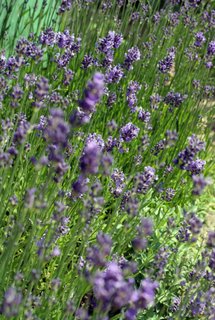 gardening is a great mindfulness practice that cultivates stillness of mind 1. Become a Gardener
Caring for flowering plants may help you relax and get grounded. In 2004, researchers at Japan’s Utsunomiya University found repotting plants lowered fatigue and promoted physiological relaxation in study participants, and that working with flowers seemed to have a stronger positive effect than working with nonflowering plants.
HEALTH BENEFITS Research shows that exposure to plants–and even just looking at them–can reduce blood pressure, increase concentration and productivity, and help you recover from illness, says Andy Kaufman, Ph.D., assistant professor of tropical plant and soil sciences at the University of Hawaii in Honolulu. He cites a classic 1984 study, published in Science, which showed that even the view of a green garden helped surgical patients recovering from gall bladder surgery. Among a group of 46 patients in a Pennsylvania hospital, the 23 who had rooms with windows facing greenery had shorter postoperative stays and needed fewer pain–relieving analgesics than the 23 whose windows faced a brick wall.
GETTING STARTED If you live in an apartment or don’t have much room to garden, invest in the EarthBox (earthbox.com), a self–watering container garden that comes with potting soil and fertilizer. “Even if you have a brown thumb, you can grow things [in it],”says David Ellis, American Horticulture Society spokesperson. You could also join a community garden; visit ahs.org, the American Horticulture Society’s website, for more info.
 yoga helps to slow us down 2. Practice Slow Yoga
Slow yoga emphasizes one drawn–out breath for each movement you make. Like tai chi, it uses many repetitive flowing moves. “When you practice slow yoga, you create more awareness between mind and body,”says Beth Shaw, founder of Yoga Fit Training Systems in Los Angeles. This creates a deep sense of stillness and helps develop patience and lower stress, she adds.
HEALTH BENEFITS Last year, researchers in Sweden and India showed that practicing yoga can reverse the negative effects of high blood pressure, obesity, and high blood sugar. The studies, published in the journal Diabetes Research and Clinical Practice, showed reduced waist circumference, blood pressure, blood sugar, and triglycerides (the chemical form of fat cells) and higher HDL (so–called good cholesterol) levels in a control group that practiced yoga versus a placebo group.
GETTING STARTED To find a Slow Yoga class near you visit yogafit.com or inquire at your local yoga studio. You might also consider restorative or yin yoga, two other gentle forms of the practice.
 Take a nap 3. Take a Nap
You snooze, you win, according to a Harvard study published last year in The Archives of Internal Medicine. Researchers revealed that people who regularly napped at least three times a week for an average of 30 minutes had a 37 percent lower risk of heart attack than those who didn’t nap. “It shows that napping is an important preventive strategy just like regular exercise, eating right, and not smoking,”says Sara C. Mednick, Ph.D., author of Take a Nap! Change Your Life (Workman, 2006).
HEALTH BENEFITS A daily nap also boosts serotonin, says Mednick, which may lead to improved memory and performance. Napping can even contribute to weight loss, according to a study in the American Journal of Physiology, Endocrinology, and Metabolism in 2007. That study looked at hormone levels in 41 men and women who were part of a seven–day sleep–deprivation experiment. Those allowed to nap for two hours following a night without any sleep showed a significant drop in cortisol, a hormone related to high levels of stress, and a complement of growth hormone, which helps regulate insulin and fat storage. Researchers concluded that a midafternoon nap improves alertness and performance and reverses the negative metabolic effects of sleep loss.
GETTING STARTED The best time to nap is between 1 p.m. and 3 p.m., but a 15– to 20–minute power nap at any time can help. Set your Zen Alarm Clock for 20 minutes. Close the office door and take a snooze, or find a quiet place where you feel safe. Nap on weekends, Mednick says. “Just don’t use the weekend to catch up on sleep lost in the week.”Check with your doctor about napping if you’re being treated for insomnia.
4. Start a Slow Hobby
 learning to paint Hobbies that require mindful, solitary activity–such as knitting, painting, sculpting, crocheting, or quilting–can act as a brake on your hectic pace.
HEALTH BENEFITS “Slow hobbies help you cultivate the lost art of concentration and being in the moment. They have a meditative quality to them,”says author Carl Honorè. “And that calming effect goes beyond the act itself. Maintaining that inner stillness enables you to negotiate the fast–moving waters of the rest of your day.”
GETTING STARTED Sixty–four percent of people who knit or crochet say they use these crafts to help them reduce stress and relax, according to the Craft Yarn Council of America. Visit craftyarncouncil.com for information. To learn about drawing, visit drawspace.com. Check with a local college or community center for other craft classes.
5. Eat Slowly
Eating too fast creates stress in the body, says nutritionist Marc David, author of The Slow Down Diet (Healing Arts Press, 2005). That causes a spike in cortisol and insulin, which in turn diminishes your ability to burn calories and makes you more likely to gain weight. Eating quickly also leads to overeating. “The brain demands more food if it doesn’t have time to register its needs for taste, aroma, and satisfaction,”says David.
HEALTH BENEFITS Taking time to eat creates a relaxation response, which means you’ll have fewer digestive complaints and your body will be able to take in the nutrients it needs. Plus “we make better food choices, and we know when to stop,”he adds.
GETTING STARTED To ease the pace, double the time you spend on your meals; for example, if you usually eat breakfast in five minutes, stretch it out to ten. “Focus on your food: Taste it, enjoy it, notice it, savor it,”says David. “Find relaxed time between bites by slowing down your internal conversation. Let go of any sense of urgency, and allow the moment to be sensual.”The cooking process can help you slow down too, says David. “Instead of microwaving something, make a soup from scratch.”
6. Do One Thing at a Time
A lot of us believe we get more done by multitasking. But research at the University of Michigan published in the Journal of Experimental Psychology in 2001, shows the opposite is true. “If you concentrate on one task at a time, you get more done faster and make fewer mistakes,” says David E. Meyer, director of the Brain, Cognition, and Action Laboratory at the University of Michigan.
HEALTH BENEFITS Taking on chores one at a time reduces chronic stress and protects your short–term memory, which comes under fire if the brain is overtaxed.
GETTING STARTED To curb outside distractions and focus better, set aside time when you can concentrate on one activity from start to finish. For example, check e–mail once an hour and turn off your instant messaging; let your phone messages go to voice mail and only check them occasionally throughout the day.
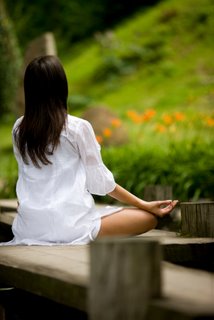 practice meditation in order to slow down 7. Meditate
“Meditation teaches us to focus,”says Steven Hartman, director of professional training at the Kripalu Health and Yoga Center (kripalu.org) in Stockbridge, Mass. “All day your mind is chattering. When you meditate, you can hear your own inner wisdom.”
HEALTH BENEFITS Studies have shown that practicing meditation also improves blood pressure, fortifies the immune system, and promotes a sense of well–being. “A daily meditation practice can bring body, breath, mind, and spirit into balance,”says Hartman.
GETTING STARTED Check out a program like Transcendental Meditation. (See tm.org.) Or begin at home: “Put an egg timer on and stay with your breath for just two and a half minutes,”says Hartman. “Keep your spine tall and straight and allow the breath to be natural.”If you’re seated on the floor, a cushion can raise your pelvis and bring your spine into a natural position. As you get comfortable with the practice, you can increase your time to 15 or 30 minutes a day.
adapted from Natural Health Magazine, by Chrystle Fiedler
One of the ultimate Zen like experiences is waking-up from a great slumber refreshed and energized. Your mind and body are harmoniously one, both alert and focused. Having a refreshed mind and body are two keys to a natural and Zen lifestyle. Waking up in the morning should not be a loud and abrupt awakening, but rather it should be a peaceful positive experience. The right natural alarm clock can transition your deep and tranquil sleep into a serene start to consciousness. Imagine a long-resonating Tibetan bell-like chime waking you up to a beautiful morning experience.
The right alarm clock can be the most beneficial investment for you. With our Now & Zen natural alarm clock you are awakened more gradually and thus more naturally. Now & Zen is focused on creating a naturalistic lifestyle, and our clocks are an example of our philosophy.
 Zen Meditation Timers with Soothing Chime Now & Zen – Soothing Chime Alarm Clock & Timer Store
1638 Pearl Street
Boulder, CO 80302
(800) 779-6383
Posted in Chime Alarm Clocks, intention, Meditation Timers, Meditation Tools, mindfulness practice, Natural Awakening, Now & Zen Alarm Clocks, sleep, Sleep Habits, wake up alarm clock, Well-being, yoga, Yoga Timer, Yoga Timers by Now & Zen, Zen Alarm Clock, Zen Timers
« Previous Page — « Previous Entries
Next Entries » — Next Page »
|
|
|
|